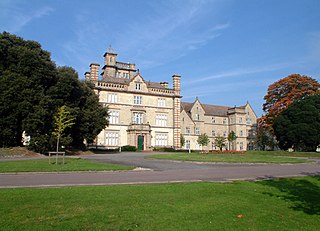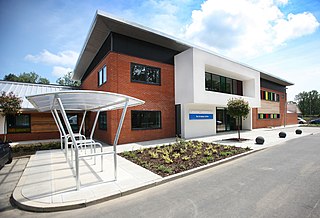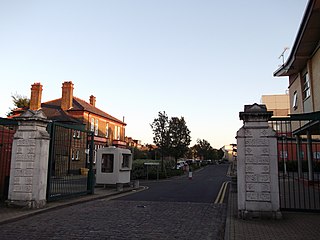
Psychiatric hospitals, also known as mental health hospitals or behavioral health hospitals, are hospitals or wards specializing in the treatment of severe mental disorders, including schizophrenia, bipolar disorder, eating disorders, dissociative identity disorder, major depressive disorder, and others.

Ashworth Hospital is a high-security psychiatric hospital in Maghull, 10 miles (16 km) northeast of Liverpool. It is a part of Mersey Care NHS Foundation Trust, catering to patients with psychiatric health needs that require treatment in conditions of high security.

The Maudsley Hospital is a British psychiatric hospital in south London. The Maudsley is the largest mental health training institution in the UK. It is part of South London and Maudsley NHS Foundation Trust, and works in partnership with the Institute of Psychiatry, King's College London. The hospital was one of the originating institutions in producing the Maudsley Prescribing Guidelines. It is part of the King's Health Partners academic health science centre and the National Institute for Health and Care Research (NIHR) Biomedical Research Centre for Mental Health.
Psychiatric nursing or mental health nursing is the appointed position of a nurse that specialises in mental health, and cares for people of all ages experiencing mental illnesses or distress. These include: neurodevelopmental disorders, schizophrenia, schizoaffective disorder, mood disorders, addiction, anxiety disorders, personality disorders, eating disorders, suicidal thoughts, psychosis, paranoia, and self-harm.

Fulbourn Hospital is a mental health facility located between the Cambridgeshire village of Fulbourn and the Cambridge city boundary at Cherry Hinton, about 5 miles (8 km) south-east of the city centre. It is managed by the Cambridgeshire and Peterborough NHS Foundation Trust. The Ida Darwin Hospital site is situated behind Fulbourn Hospital. It is run and managed by the same trust, with both hospitals sharing the same facilities and staff pool.
Nursing credentials and certifications are the various credentials and certifications that a person must have to practice nursing legally. Nurses' postnominal letters reflect their credentials—that is, their achievements in nursing education, licensure, certification, and fellowship. The letters usually appear in the following order:

A mental health trust provides health and social care services for people with mental health disorders in England.
Therapeutic community is a participative, group-based approach to long-term mental illness, personality disorders and drug addiction. The approach was usually residential, with the clients and therapists living together, but increasingly residential units have been superseded by day units. It is based on milieu therapy principles, and includes group psychotherapy as well as practical activities.
A virtual ward allows patients to get the care they need at home safely and conveniently, rather than being in hospital.

The Royal South Hants Hospital, known locally as "The RSH", is a community hospital in Southampton. It is managed by NHS Property Services.

Stobhill Hospital is located in Springburn in the north of Glasgow, Scotland. It serves the population of North Glasgow and part of East Dunbartonshire. It is managed by NHS Greater Glasgow and Clyde.

The St Aubyn Centre is a mental health facility at 216 Turner Road, Colchester, Essex. It has two wards: (i) Longview Ward which is a General Adolescent unit which provides care and treatment for young people with mental health difficulties between the ages of 13 and 18 and (ii) Larkwood Ward which is a Psychiatric Intensive Care Unit (PICU) caring for children of the same age group. Larkwood is the only Psychiatric Intensive Care Unit in the NHS East of England region for young people.

Lambeth Hospital is a mental health facility in Landor Road, South London. It was previously known as the "Landor Road hospital" and is now operated by the South London and Maudsley NHS Foundation Trust and is affiliated with King's College London's Institute of Psychiatry. It is also part of the King's Health Partners academic health science centre and the National Institute for Health and Care Research (NIHR) Biomedical Research Centre for Mental Health.

Mersey Care NHS Foundation Trust runs a specialist mental health trust and provides learning disabilities, addiction management, acquired brain injury services and the provision of community nursing and therapies services in The City of Liverpool and Sefton. It provides secure mental health services for the North West of England, the West Midlands and Wales, one of only three NHS organisations in England offering high secure services. It also runs mental health wards at Rathbone Hospital in Wavertree, the Broadoak Unit at Broadgreen Hospital, Mossley Hill Hospital, Windsor House on Upper Parliament Street in Central Liverpool and Heys Court in Garston, Merseyside. The trust gained Foundation trust status in May 2016.
A Mental Health Nurse (MHN) refers to a psychiatric nurse in the UK, who specializes in the care of patients with mental health issues.
Callington Road Hospital is a psychiatric hospital in Bristol, England. Opened in 2006, it primarily replaced Barrow Hospital, providing psychiatric inpatient and community services for Bristol and the surrounding region. It is run by the Avon and Wiltshire Mental Health Partnership NHS Trust.
A high-dependency unit (HDU) is an inpatient psychiatric ward, typically with only a small number of beds, attached to an acute admissions ward. It is intended to provide treatment for patients who cannot be managed safely on an acute (open) ward, but do not meet the threshold for admission to PICU. The number of staff per patient will be higher than the associated acute ward, but may be lower than levels at a PICU.

The Gordon Hospital is a 55-bed acute adult mental health hospital located in Westminster, London. It is managed by the Central and North West London NHS Foundation Trust.

Littlemore Hospital was a mental health facility on Sandford Road in Littlemore, Oxfordshire.
Atherleigh Park Hospital is a mental health facility at the former Leigh East rugby league ground on Atherleigh Way in Leigh, Manchester, England. It is managed by Greater Manchester Mental Health NHS Foundation Trust.











